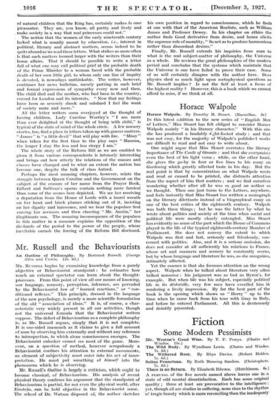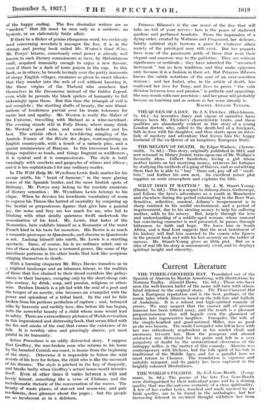action
F•
Some Modern Pessimists
There is no Return. By Elizabeth Bibesco. (Hutchinson. OF.) A PERUSAL of the Ave novels ,named above' leavps one in:a state of odd mental dissatisfaction. Each has some original quality ; three at least are 'provodative to the -intelligence ; yet, though all are studies in suffering, none rises to the rhythtn of tragic beauty which is more reconciling than the inadequady of the happy ending. The five dissimilar writers are so "modem " that life must be seen only as a sardonic, an hysteric, Or 'an elaborately futile affair.
If there be a flicker of genius (dangerous word, too recklessly used concerning novelists !) amongst the five, it is in the strange and jarring book called Mr. Weston's Good Wine. Mr. Powys' bizarre, consciously cruel power is already well known to such literary connoisseurs as have, by Mithridatean craft, acquired immunity enough to enjoy a new flavour, even if there be a dash of tonic poison in the cup. In this book; as in others, he broods lovingly over the pretty innocents of sleepy English villages, creatures so given to sweet idiocies that they wander into the web of evil without knowing it, like those virgins of the Thebaid who somehow find themselves in the Decameron instead of the Golden Legend, even while he permits the black spiders of humanity to fall sickeningly upon them. But this time the triumph of evil is not complete ; the startling shafts of beauty, the rare illumi- nations of tenderness prevail over his ironic tolerance for rustic lust and apathy. Mr. Weston is really the Maker of the Universe, travelling with Michael as a wine-merchant. The evening stands still in Folly Down, where many drink Mr. Weston's good wine, and some his darkest and his best. The artistic effect is a bewildering mingling of the Anatole France of the Revolte des Anges, contemplating an English countryside, with a touch of a miracle play, and a quaint reminiscence of Bunyan. In this irreverent book are things repulsive as toads, and things fragrant as wallflowers it is cynical and it is compassionate. The style is built cunningly with crockets and gargoyles of whims and idlesse ; and it is too sophisticated for any ordinary reader.
In The Wild Body Mr. Wyndham Lewis finds matter for his savage mirth, his " beast of humour," in the more glaring towns of the Spanish border, and the more brutish spots of Brittany: Mr. Powys may belong to the resolute amateurs of literary sensation ; Mr. Wyndham Lewis belongs to his clique. When he devotes his inordinate vocabulary of scorn to express his Timon-like hatred of mortality by conjuring up the bestial or preposterous figures that give him a painful joy, the noise and fury are too much for me, who fall to thinking with what deadly quietness Swift undertook the assassination of his kind. Mr. Lewis, that hater of the Romantics, here exhibits himself as a Romantic of the worst French kind in his taste for monsters. His Bestre is as much a romantic grotesque as Quasimodo, and obscene as Quasimodo is not. Lashing himself into mirth, Mr. Lewis is a startling spectacle: Since, of course, his is no ordinary mind, one or two of these sketches have a tortured power, like some of the interlinear patterns in his other books that look like scorpions stinging themselves to death.
With a burning eloquence Mr. Rhys Davies transfers us to a blighted landscape and an inhuman labour, to the realities of those that live chained to their dread corridors like galley- slaves to their barques, escaping only by the short cheap cuts into ecstasy, by drink, song, and passion, religious or other- wise. Reuben Daniels is a pit-lad with the soul of a poet and the temper of an ascetic, who becomes an evangelist with the power and splendour of a tribal bard. In the end he falls broken from his perilous perihelion of rapture ; and, betrayed alike .by heavenly and earthly love, dies before life has begun, with the sorrowful beauty of a child whom none would lead to safety. There are extraordinary pictures of Welsh revivalism in this impassioned and distressing book, that seems filled with the fire and smoke of the coal that curses the existence of its folk.: It is terribly alive and piercingly sincere, yet most pitiful in its humanity.
Selina Pennalunct is an oddly distracted story. I suppose that qeOffrey, the war-broken man who returns to his home by the haunted Cornish sea-coast, is insane from the beginning of the story. Otherwise it is impossible to follow the wild reverie of his love for Selina, the child who is like the mermaid of hia"dreams. The style is pitched in the key of rhapsody, and bieilis badly when Geoffrey's actual home-world intrudes itself!-: Even at other times it varies between a wild and lovely lament, something like a verse of Ulalunte, and the melodramatic rhetoric of the conversation of the waves. The beauty of waste places, of star-set and moon-rise, and pale sea4Wwits,idoes glimmer about the pages ; but the people are as incoherent as in a delirium.
-Princess Bibesco's is the one novel of- the five that will take no toll of your nerves : hers is the peace of sheltered gardens and perfumed boudoirs. From the impression of a dying order, created by Watteau and Fragonard, her delicate; faintly satirical style borrows a grace for whatever silken society of the privileged may still exist. But her puppets have none of the passionate pride of those that went their elegant and amorous way to the guillotine. They arc without significance or certitude ; they have inherited the "unearned increment " but no fiery tradition, and they make epigrams only because it is a fashion in their set. But Princess Bibesco knows the subtle notations of the soul of an over-sensitive woman ; and her Isabel, who, in the article of death, has confessed her love for Tony, and lives to prove " the vain division between love and passion," is pathetic and appealing. She uses words with rare precision ; -and her prose will probably become as touching and as serious as her verse already is.
RACHEL ANNAND TAYLOR.











































































 Previous page
Previous page